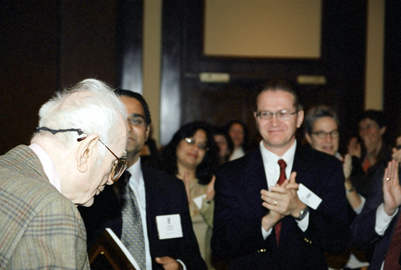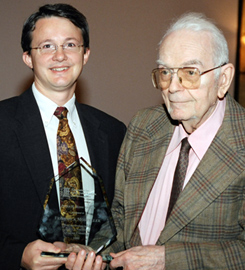Return to the Rossi Award page.


Charles Frederick Mosteller, known affectionately
by his colleagues and protégés as “Fred,” is the Roger
I. Lee Professor of Mathematical Statistics, Emeritus, at Harvard University.
Many of Mosteller’s works in both theoretical and applied statistics are
considered classic texts. Mosteller helped popularize the term “Type III
error” to describe instances where scientists rightly reject the null
hypothesis, but for the wrong reason. One of his many important contributions
to statistics is Understanding Robust and Exploratory Data Analysis.
His work and influence have extended to other fields, particularly health care
and school education. Appropriately, a book celebrating Mosteller’s contributions
to statistics, science, and public policy is titled A Statistical Model.
Beginnings
Mosteller was born on December 24, 1916. He attended Carnegie
Institute of Technology (now Carnegie-Mellon University), from which he graduated
with both Bachelor (1938) and Masters (1939) of Science degrees in Mathematics.
It was during these educational pursuits that Mosteller turned to statistics,
rather than engineering. He then went to Princeton, where he received both a
Masters (1942) and Doctorate (1946) degree in Mathematics.
During World War II, he worked with a group that provided
statistical and research support to the U.S. War Department. One of his projects
involved calculating the dispersion of a string of bombs. He also
assisted Samuel Wilks in editing the Annals of Mathematical Statistics.
At age thirty, Mosteller accepted a lecturer and research
associate post in Harvard University’s Department of Social Relations.
He served in this role for five years, from 1946–1951. By 1951, he was
named professor of Mathematical Statistics, and in 1953, acting chair of the
Department of Social Relations.
An influential statistician
In the early 1950s, there were only nine professors of statistics
at Harvard University and no more than three in the same department. Mosteller
spearheaded the effort to bring the statisticians together in a “Statistics
Department” at Harvard. In 1957, Mosteller was appointed chair of the
new department, a position he held for fifteen years—including the first
twelve years of the department’s existence.
Mosteller was one of the pioneers in bringing the teaching
of statistics and probability to American schools, writing textbooks and teachers’
manuals and developing standards for teaching mathematics. In 1961, Mosteller “starred”
in the first televised education course for college students on statistics,
Continental Classroom, on NBC. The program was seen on 170 stations,
viewed by over a million people, featured at 320 colleges and universities,
and had over 75,000 students taking the course for credit.
Mosteller also wanted statistics to play a more important
role in history and public policy. In the first of several classic works, he
collaborated with David Wallace in applying statistical analyses to answer the
controversial historical question of whether James Madison or Alexander Hamilton
had authored the anonymous Federalist Papers. Using their analysis
of word choices and patterns in other documents known to have been authored
by Madison and Hamilton, they concluded that Madison was the likely author of
the twelve anonymous papers (Mosteller and Wallace 1964). Mosteller also served
as vice-chairman of the President’s Commission on Federal Statistics,
an effort that eventually led to the National Research Council’s Committee
on National Statistics. By 1964, he was appointed to the Board of Trustees of
the prestigious National Opinion Research Center (NORC) at the University of
Chicago. Many other organizations asked Mosteller to join their governing boards,
including the Russell Sage Foundation (1964–1985), and the Social Science
Research Council, which he chaired from 1965 to 1969.
Forays into education and health care
During the 1960s Mosteller began a friendship with Daniel
Patrick Moynihan, a professor of government at Harvard University, after attending
a seminar Moynihan had organized on educational inequality affecting minorities
in the United States. Mosteller’s collaboration with Moynihan that fully
engaged him in educational research. Their meetings resulted in the landmark
publication On Equality of Educational Opportunity (Mosteller and Moynihan
1972).
In 1972, Mosteller and then-dean of the Harvard School of
Public Health, Howard Hiatt, instituted a series of seminars, focusing on problems
in health and medicine. These were very popular, sometimes drawing over 100
faculty and clinicians. The seminar met for three years and broke into smaller
groups that met regularly, conducted studies, and published results. One of
the seminar’s product was the pioneering book Costs, Risks, and Benefits
of Surgery (Bunker, Barnes and Mosteller 1977).
In 1977, Mosteller accepted an offer by Hiatt to become Chair
of the department, a post he held until 1981. Mosteller’s leadership is
credited with transforming the department into one of the “top biostatistics
units in the world.” He would later (in 1997) become the first recipient
of the Marvin Zelen Leadership Award from the Harvard Department of Biostatistics,
and one of two endowed professorships in the department now bears Mosteller’s
name.
When asked to lead the Department of Health Policy and Management
in the mid-1980s, Mosteller became the first and only Harvard faculty member
in history to chair four different departments. He held this post until 1987.
Emeritus years and the Center for Evaluation at Harvard
After forty-one years as an active faculty member (having
also taught in Harvard’s Law School and its Kennedy School of Government),
Mosteller was designated professor emeritus of mathematical statistics in 1988.
Until his move from Massachusetts in 2003, he maintained an office at Harvard,
an active research program, and daily office hours in the Department of Statistics.
During this era, Mosteller collaborated with Thomas Chalmers
in the Health Care Technology Assessment Group, where they and others contributed
to the development of methodology for systematic reviews and meta-analyses and
its application in practice.
In 1990, Howard Hiatt began an Initiative for Children program at the American
Academy of Arts and Sciences in Cambridge, Massachusetts. The project sought
to initiate programs to help children and bring research to bear on issues affecting
young people. Hiatt and other Academy Fellows leading the Initiative for Children
insisted that all the programs they undertook would be evaluated rigorously.
Hiatt writes that:
we were unanimous in insisting that whatever programs we undertook would
be subjected to rigorous statistical evaluation. And that, in turn, meant
that we should do all we could to persuade Fred Mosteller . . . to join us.
Mosteller received funding from the Mellon Foundation to support
a Center for Evaluation, where he served as director and used the funding to
collaborate with a number of researchers on issues affecting children. One outcome
of the center’s work was to encourage the use of randomized controlled
trials to evaluate educational innovations. Mosteller was praised for “demonstrating
that clinical trials can extend beyond medicine to bring new understanding to
educational practices and innovations.”
Mosteller also worked with Hiatt and others to organize conferences
in Cambridge, Massachusetts, and Washington, DC on the need for fair tests of
school innovations. The conference proceedings were published in Evidence
Matters: Randomized Field Trials in Education, co-edited by Mosteller with
Robert Boruch. These efforts have been credited with helping to influence decisions
by the U.S. Department of Education to support experimental research. When the
Initiative for Children program ended in 2002, both Hiatt and Mosteller were
honored for their work.
Honors
 The
honors received by Mosteller cannot all be listed here, but they include a Guggenheim
Fellowship (1969–1970); honorary doctorates in science from the University
of Chicago (1973), Carnegie-Mellon University (1974), Yale University (1981),
and Wesleyan University (1983), and an honorary doctorate in law (1991) from
Harvard University. He is a member of the National Academy of Sciences, the
American Philosophical Society, the American Academy of Arts and Sciences, and
an honorary member of the Royal Statistical Society. He has been president of
the Psychometric Society (1957–1958), the American Statistical Association
(1967), the Institute of Mathematical Statistics (1974–1975), and the
American Association for the Advancement of Science (1980). Mosteller received
the American Evaluation Association’s Myrdal Science Award (1973); the
Council for Applied Social Research’s Paul Lazarsfeld Prize for Applied
Social Research (1979); the Samuel S. Wilks Award from the American Statistical
Association (1986); the R.A. Fisher Award and Lectureship from the Committee
of Presidents of Statistical Societies (1987); the Surgeon General’s Medallion
from the U.S. Centers for Disease Control for contributions to the nation’s
health (1988); and Statistician of the Year Award of the Boston Chapter of the
American Statistical Association (1990), an award that was recently renamed
to honor him.
The
honors received by Mosteller cannot all be listed here, but they include a Guggenheim
Fellowship (1969–1970); honorary doctorates in science from the University
of Chicago (1973), Carnegie-Mellon University (1974), Yale University (1981),
and Wesleyan University (1983), and an honorary doctorate in law (1991) from
Harvard University. He is a member of the National Academy of Sciences, the
American Philosophical Society, the American Academy of Arts and Sciences, and
an honorary member of the Royal Statistical Society. He has been president of
the Psychometric Society (1957–1958), the American Statistical Association
(1967), the Institute of Mathematical Statistics (1974–1975), and the
American Association for the Advancement of Science (1980). Mosteller received
the American Evaluation Association’s Myrdal Science Award (1973); the
Council for Applied Social Research’s Paul Lazarsfeld Prize for Applied
Social Research (1979); the Samuel S. Wilks Award from the American Statistical
Association (1986); the R.A. Fisher Award and Lectureship from the Committee
of Presidents of Statistical Societies (1987); the Surgeon General’s Medallion
from the U.S. Centers for Disease Control for contributions to the nation’s
health (1988); and Statistician of the Year Award of the Boston Chapter of the
American Statistical Association (1990), an award that was recently renamed
to honor him.
Mosteller has authored or co-authored over 360 papers, including
one with each of his children. He has also published fifty-seven books, thirty-six
reports, and twenty-five reviews.
A slightly longer version of this biographical note has been published
by the James Lind
Library, which documents the evolution of fair tests of medical treatments.
Back to top